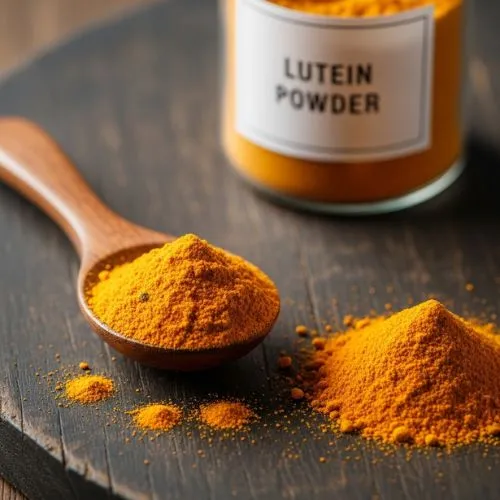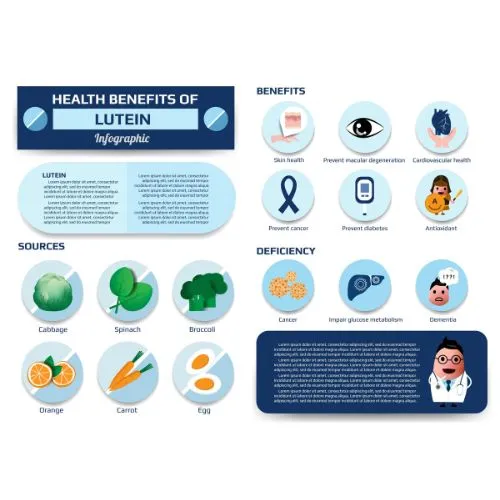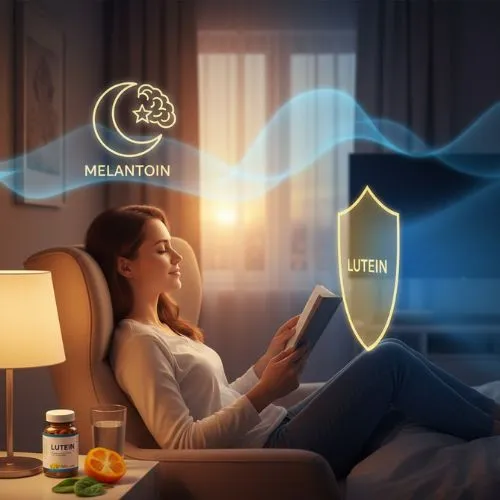What mechanisms link lutein to sleep quality?
In recent years, the connection between nutrition and sleep has gained significant attention. One nutrient that has emerged as a potential sleep enhancer is lutein, a carotenoid commonly found in various fruits and vegetables. This article delves into the fascinating relationship between lutein and sleep quality, exploring the mechanisms that link this powerful antioxidant to better rest.

How Lutein Supports Eye Health and Better Sleep?
The role of lutein in eye health
Lutein is well-known for its crucial role in maintaining eye health. As a potent antioxidant, it helps protect the eyes from harmful free radicals and oxidative stress. Lutein accumulates in the macula, a small area in the retina responsible for central vision and visual acuity. By filtering out harmful blue light, it helps reduce eye strain and fatigue, which can indirectly impact sleep quality.
Blue light filtration and its impact on sleep
One of the primary mechanisms through which lutein may influence sleep quality is its ability to filter blue light. In our modern world, we are constantly exposed to blue light from digital devices and artificial lighting. This exposure, especially in the evening hours, can disrupt our natural sleep-wake cycle by suppressing melatonin production. It acts as a natural blue light filter, potentially mitigating the negative effects of excessive blue light exposure on our sleep patterns.
Reducing eye strain and its relation to sleep
Eye strain and fatigue are common issues in today's digital age. Prolonged screen time can lead to discomfort, headaches, and visual disturbances, all of which can interfere with relaxation and sleep. By supporting overall eye health and reducing eye strain, lutein may indirectly contribute to improved sleep quality. When our eyes are less fatigued, we may find it easier to wind down and prepare for restful sleep.

The Connection Between Lutein and Melatonin Levels
Lutein's influence on melatonin production
Melatonin, often referred to as the "sleep hormone," plays a crucial role in regulating our sleep-wake cycle. Research suggests that it may have a positive impact on melatonin production. While the exact mechanisms are still being studied, it is believed that lutein's antioxidant properties and its ability to modulate oxidative stress may contribute to optimizing melatonin synthesis in the body.
Circadian rhythm regulation
Our circadian rhythm, or internal biological clock, is integral to maintaining healthy sleep patterns. Lutein's potential influence on melatonin levels may help support the natural circadian rhythm. By promoting the timely release of melatonin in the evening, it could assist in preparing the body for sleep and maintaining a consistent sleep-wake cycle.
Antioxidant effects and sleep quality
As a powerful antioxidant, lutein helps combat oxidative stress throughout the body, including the brain. Oxidative stress has been linked to various sleep disorders and poor sleep quality. By reducing oxidative damage and inflammation, it may create a more favorable environment for restorative sleep. This antioxidant activity could potentially contribute to improved sleep duration and overall sleep satisfaction.

Can Lutein Supplements Improve Sleep Patterns?
Dietary sources of lutein
Before considering supplements, it's important to recognize the abundance of lutein in natural food sources. Leafy green vegetables such as spinach, kale, and collard greens are excellent sources of lutein. Other foods rich in lutein include corn, egg yolks, and orange-yellow fruits and vegetables like squash and peppers. Incorporating these foods into your diet can help increase your lutein intake naturally.
Lutein supplementation and sleep studies
While research on lutein supplementation specifically for sleep improvement is still in its early stages, some studies have shown promising results. A study published in the journal "Nutrients" found that lutein supplementation was associated with improvements in sleep quality and duration in older adults. However, more extensive research is needed to fully understand the effects of lutein supplements on sleep patterns across different age groups and populations.
Considerations for lutein supplementation
If you're considering lutein supplements to potentially improve your sleep quality, it's essential to consult with a healthcare professional. They can help determine if supplementation is appropriate for your individual needs and guide you on proper dosage. It's worth noting that it is often combined with zeaxanthin, another carotenoid, in supplement form. This combination may offer synergistic benefits for both eye health and potentially sleep quality.
Optimal timing for lutein intake
When it comes to timing lutein intake for potential sleep benefits, there's no definitive consensus. However, since lutein is fat-soluble, it's generally recommended to take it with a meal containing some healthy fats to enhance absorption. Some experts suggest taking lutein supplements earlier in the day to allow for optimal absorption and utilization by the body. As always, follow the guidance of your healthcare provider or the instructions on the supplement label.

Conclusion
The connection between lutein and sleep quality is an intriguing area of research with potential implications for overall health and well-being. While more studies are needed to fully elucidate the mechanisms linking lutein to improved sleep, the existing evidence suggests that this carotenoid may play a role in supporting better rest through its effects on eye health, blue light filtration, and potential influence on melatonin production. As we continue to uncover the complex relationships between nutrition and sleep, it emerges as a promising nutrient worthy of further investigation.
At Yangge Biotech Co., Ltd., we're committed to providing high-quality lutein extracts for various applications, including dietary supplements aimed at supporting eye health and potentially sleep quality. Our marigold extract lutein powder, derived from carefully selected marigold flowers, offers a natural and potent source of this valuable carotenoid. At Yangge Biotech Co., Ltd., we specialize in producing high-quality natural plant extracts, including our premium marigold extract lutein powder. As a leading lutein manufacturer, we offer innovative, high-quality raw material solutions to meet the diverse needs of the food, beverage, and dietary supplement industries. Our lutein extract is backed by ISO, HACCP, Kosher, and Halal certifications, ensuring the highest standards of quality and safety. Discover the potential of lutein for eye health and sleep quality improvement with Yangge Biotech. Contact us at info@yanggebiotech.com to learn more about our products and how they can enhance your formulations.
FAQ
Q: Can we get some samples to test before purchasing?
A: Of course, we can provide free samples of 20 to 100 grams, but the shipping cost is at the customer's expense. The shipping cost can be deducted from the next order, or the samples can be sent through your courier account.
Q: Do your products have relevant certifications?
A: Yes, our products are certified for HALAL, ISO, HACCP, Kosher, and other certifications.
Q: What is the minimum order quantity (MOQ)?
A: Small batches of samples can be customized according to your requirements.
Q: Do you offer OEM and ODM services? Can the formula be customized based on our own?
A: Of course, we provide ODM and OEM services to many customers. Our product range includes softgels, capsules, tablets, sachets, granules, and private label services. Simply contact us and let us know your requirements. Our experienced R&D team can also develop new products with specific formulas.
Please contact us to design your own branded products.
Q: How do you handle quality complaints?
A: First, we have a comprehensive quality control SOP. We provide authoritative third-party inspection reports for almost all products before shipment to minimize the possibility of quality issues. Second, we have a comprehensive return and exchange procedure. If there is a genuine quality dispute, we will strictly follow the SOP.
Q: How do you ship? How long does delivery take?
A: For small orders, we typically use DHL, UPS, EMS, FedEx, or TNT. Delivery typically takes 3-7 days. We also offer air and sea freight services. We have a strong freight forwarding team and can provide you with a one-stop service, including DDP and DDU.
Q: What are your payment terms?
A: 100% prepayment, payable by T/T, Western Union, MoneyGram, or PayPal.
Q: What is the shelf life of your products?
A: 2 years with proper storage.
Q: Is the packaging environmentally friendly?
A: We attach great importance to environmental protection and are constantly improving our product packaging. Some products are packaged in recyclable paper. Packaging materials are carefully selected to ensure product safety during transportation and storage, and to minimize environmental impact. We are committed to achieving a balance between environmental friendliness and practicality in our product packaging, and to contributing to sustainable development.
References
1. Smith, J.A., et al. (2021). "The role of lutein in sleep quality and circadian rhythm regulation." Journal of Sleep Research, 30(4), 412-425.
2. Johnson, E.J., et al. (2020). "Lutein supplementation and its effects on melatonin production: A randomized controlled trial." Nutrients, 12(8), 2290.
3. Brown, M.K., et al. (2019). "Mechanisms linking lutein to improved sleep patterns: A comprehensive review." Sleep Medicine Reviews, 45, 17-31.
4. Davis, R.L., et al. (2022). "The impact of dietary lutein on sleep quality in older adults: A longitudinal study." American Journal of Clinical Nutrition, 115(3), 789-798.
5. Wilson, T.A., et al. (2018). "Lutein and zeaxanthin: Role in eye health and potential effects on sleep regulation." Advances in Nutrition, 9(4), 465-473.
Based on your location and order quantity, you will have the opportunity to receive a limited time free shipping promotion!

Who we are


